We’re more than halfway through 2021 and by now, most marketing teams are heavily reliant on growth/digital marketing, and for very good reasons. But right now, even that is no longer enough. Just being growth-oriented and data-driven will not cut it anymore.
In order to scale up your marketing results, move fast, and be ready to beat your competitors, you will need to harness more technology and automation than ever before.
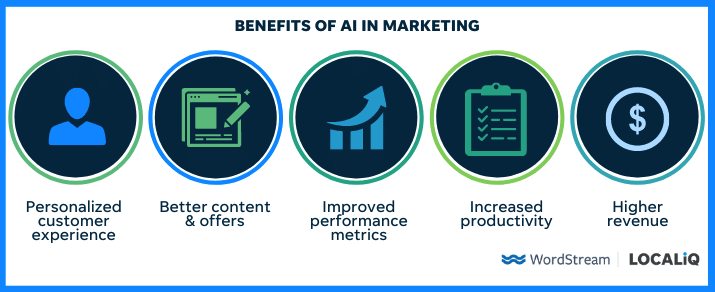
In other words, it’s 2021 and time you start using artificial intelligence (AI) in your marketing—but it’s actually much easier than you may think.
In this post, I’m going to cover the definition and benefits of AI in marketing, as well as four practical ways to use it to hit your goals. These include:
- Anyword to write your best marketing copy on any channel
- Dynamic Search Ads to take care of your keyword research and headlines
- Google Analytics Intelligence to answer questions you didn’t know to ask
- Helixa to get an even deeper understanding of any audience.
What is AI marketing?
Artificial intelligence (AI) is a broad term that represents several technologies to help your business with both internal operations and customer-facing initiatives. For example
- Enhancing chatbots with natural language processing (NLP) to qualify leads without forms.
- CRMs that use machine learning to help businesses analyze every aspect of a customer’s relationship.
- Apps that use deep learning to take personalization to another level.
The possibilities of using AI for your marketing strategy are constantly growing, and we will not cover all of them in this post. (Anyway, it will be impossible to cover everything, as new technologies and companies are being formed all the time.)
Why you need AI in marketing
With AI in marketing, you can:
- Cut operational costs by accomplishing more, in less time, with a smaller team.
- Make the most of your budget with data-driven decisions
- Automatically apply optimizations based on performance data.
- Write more effective copy to increase conversion rates.
- Bid smarter in your campaigns.
- Build a marketing strategy customized to your team’s needs and marketing objectives.
Put simply, using AI in your marketing efforts can help you keep a lean and mean marketing team and scale your business higher and faster.

4 practical ways to use artificial intelligence in marketing
There are tons of marketing tools and technologies out there that can make your marketing team stronger and more efficient. Don’t worry though, this will not be just a list of automation marketing tools out there (I know you’ve already seen dozens of them).
Instead, I would like to show you four of the most effective AI marketing tools and features you can use today that, frankly speaking, will do a better job than a human at most aspects of digital marketing in 2021.
So here are my four favorite ways to use AI for marketing:
1. Make your life easier with Google Dynamic Search Ads (DSAs)
What they are
Dynamic Search Ads (DSAs) are search campaigns that work in the opposite direction of typical paid search strategies. Usually, you will perform your keyword research, group your keywords, and then match the ad and landing page copy to the ad group.
With DSAs, all you have to do is choose the landing pages you wish to promote and Google will do the rest. Google’s AI scans the landing pages, chooses the keywords for you, and then generates accurate ad headlines.
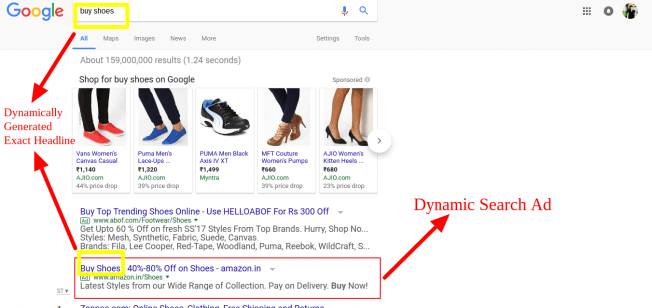
Why you need them
DSA campaigns have been around for a while now, but campaign managers historically have not trusted them due to poor performance. But Google has made some major improvements in DSA campaigns in the last few years and I was personally able to improve my SEM CPA by 60% with it, and this is without including the time I saved by using it.
I personally think the name is inaccurate, as it might make you think DSA will just create dynamic search ads for you. These are actually Responsive Search Ads (RSAs). But DSAs actually do so much more than that, all based on Google’s AI (I think we can all agree they kind of know what they are doing over there in Mountain View).
How to use them
There are a few ways to structure and operate your DSA campaigns, but they are all similar.

You can start off by trying it for a small section of your site, or maybe your blog or resources, and see how it does most of the work for you.
Just make sure to exclude irrelevant keywords or even pages you do not wish to promote. For example, you will probably find it redundant to have DSAs promoting your careers page.
Bottom line: Using DSA campaigns will save you the time of constantly searching for new keyword ideas and writing ads.
2. Use Google Analytics Intelligence as your site analyst
What it is
The Analytics Intelligence feature in your Google Analytics account uses machine learning to help you better understand your website’s results and act upon them.
How it works
Since it is AI based, you can actually ask simple questions regarding your site performance, and it will answer, just as you would have an analyst working for you.

You can think of it as kind of your Google Analytics assistant. For example, you can ask questions like “Which marketing channel had the highest conversion rate” and Analytics will show you a ranked list of your marketing channels, sorted by the highest conversion rate. This makes all the complexity of Google Analytics go away.
In the example below, I asked Google Analytics “What are my top performing landing pages?” and got exactly the answer I needed:
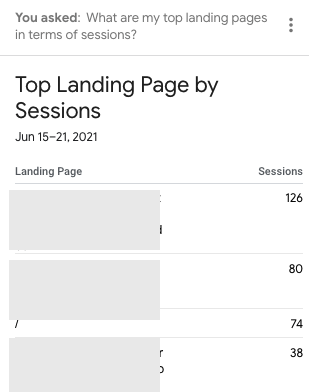
Why you need it
Analytics Intelligence can also analyze your data and answer questions you hadn’t even thought to ask, but probably should have, and highlight things you should be aware of. For example, it will point out to you that a certain landing page is performing better or worse than a previous time period. Definitely something you should be aware of and checking, but without it, you might not even notice it.
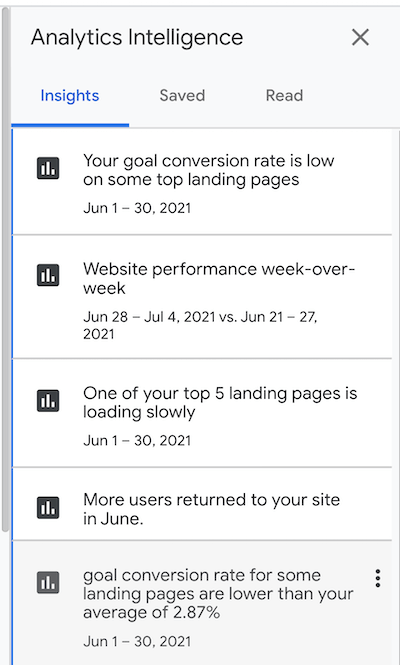
But actually, there’s even more usage of AI and machine learning here. Analytics Intelligence uses website data and leverages your Google Ads account’s smart goals, smart lists, session quality, and conversion probability to build audiences for you to target.
Bottom line: If DSAs are your omnipotent campaign managers, Google Intelligence is your analyst.
3. Use the Anyword AI for better copywriting
For ad copy, landing pages, social posts, and more.
What it is
Anyword helps you come up with new ideas when you’re drawing a blank and saves time by generating and optimizing your marketing copy with the help of artificial intelligence. It will generate effective copy for practically any marketing channel, including (but not limited to):
- Email subject lines
- Facebook ad copy
- Google Ads copy
- LinkedIn ad copy
- Twitter ad copy
- Product descriptions and names
- Intro paragraphs
- Instagram captions
- YouTube titles and descriptions
- CTAs
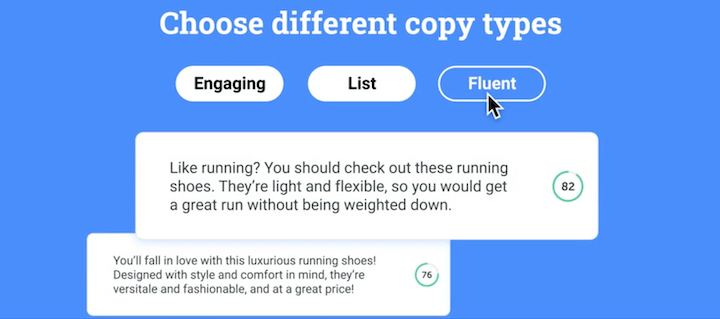
Why you need it
One of the biggest challenges when it comes to writing marketing copy is that it’s practically a gamble, as you can not really predict how it will perform before you actually use it. To find out what works you usually have to wait for SEO metrics to accumulate or dedicate time and money to A/B testing. Anyword was trained using over $250M worth of ad spend, so it knows how to write copy that sells.
How it works
Within the tool, every copy variation is given a Performance Prediction Score, which predicts how well it will perform in a real campaign. Anyword also offers more advanced features including landing page text optimization and custom integrations.
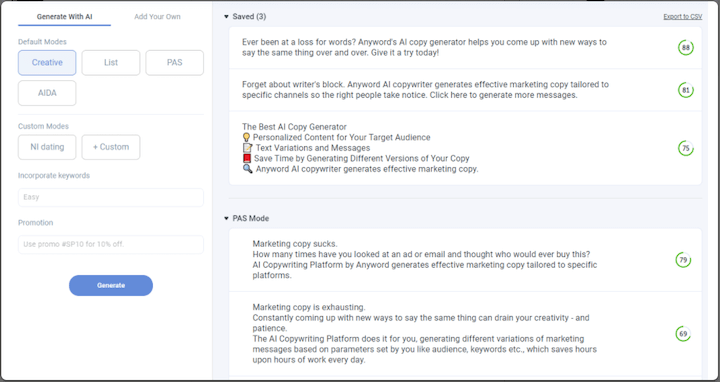
Bottom line: Anyword uses AI to spare you the time, effort, and dollars it takes for impressive copywriting and compelling ad copy.
4. Get to know your audience better with Helixa
And take personalization to a whole new level.
What it is
Helixa enables you to know what is distinctive and unique about any audience out there. You will get insights on what they care about and what they say online so you can personalize your marketing even further.
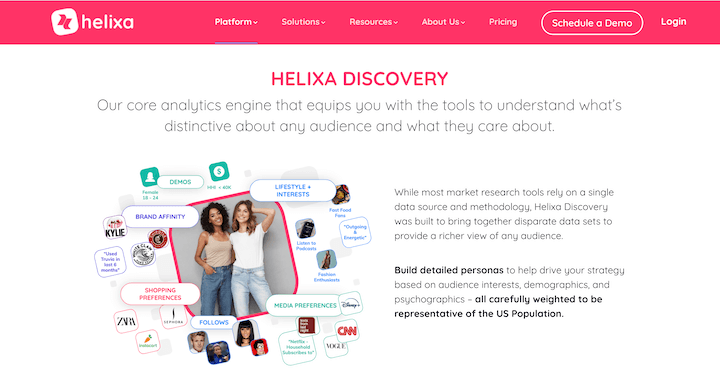
Why you need it
While most of the market research tools out there rely on a single data source, Helixa brings together multiple data sets to provide a richer view of any audience, using its machine learning technology that puts all this data in one easy-to-use tool.
Helixa gives you actionable insights that can save you from making mistakes in how you approach your potential audience.
Bottom line: The more you know about your audience, the better and more accurate your marketing will be, and you will get exactly that with Helixa.
It’s 2021 and digital marketing is AI marketing
The full list of tools, features, use cases, and benefits of AI in marketing are endless. I showed you four examples which I personally think demonstrate how AI can be used very smartly and make your day-to-day life as a marketer easier and more effective. These include:
- Anyword to generate effective, platform-specific marketing copy.
- Google DSAs to take care of keyword research and optimized ad copywriting.
- Google Analytics Intelligence to answer complex questions and share insights you wouldn’t know to search for.
- Helixa to get to know your audience on a deeper level for more personalized marketing.
Artificial intelligence is shaping marketing. Marketers that don’t get behind this transformation will stay behind and slowly become irrelevant. Being data-driven is an absolute must today, but you need to be prepared for the future, as it is coming faster than you imagine.
I would love to see your feedback and comments, and even better, your suggestions for AI tools you have been using and think I should get to know.







